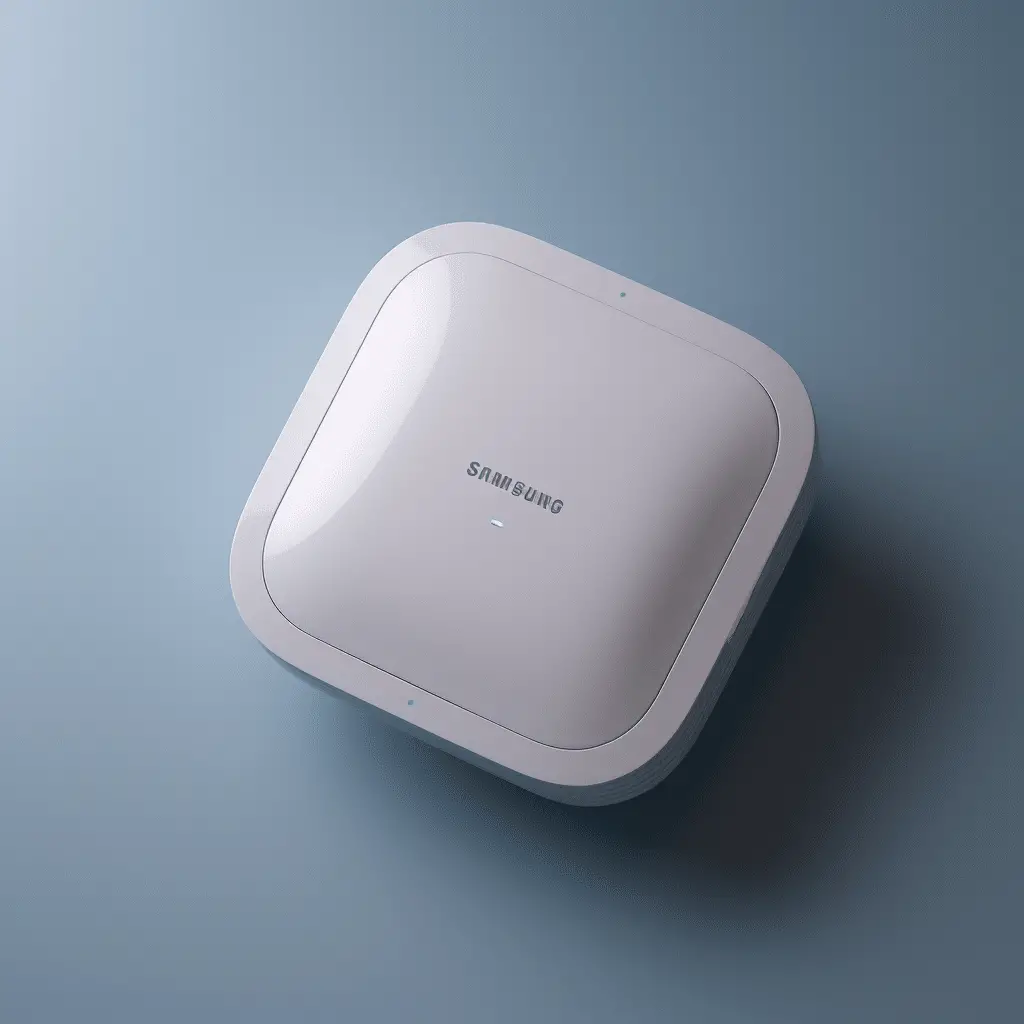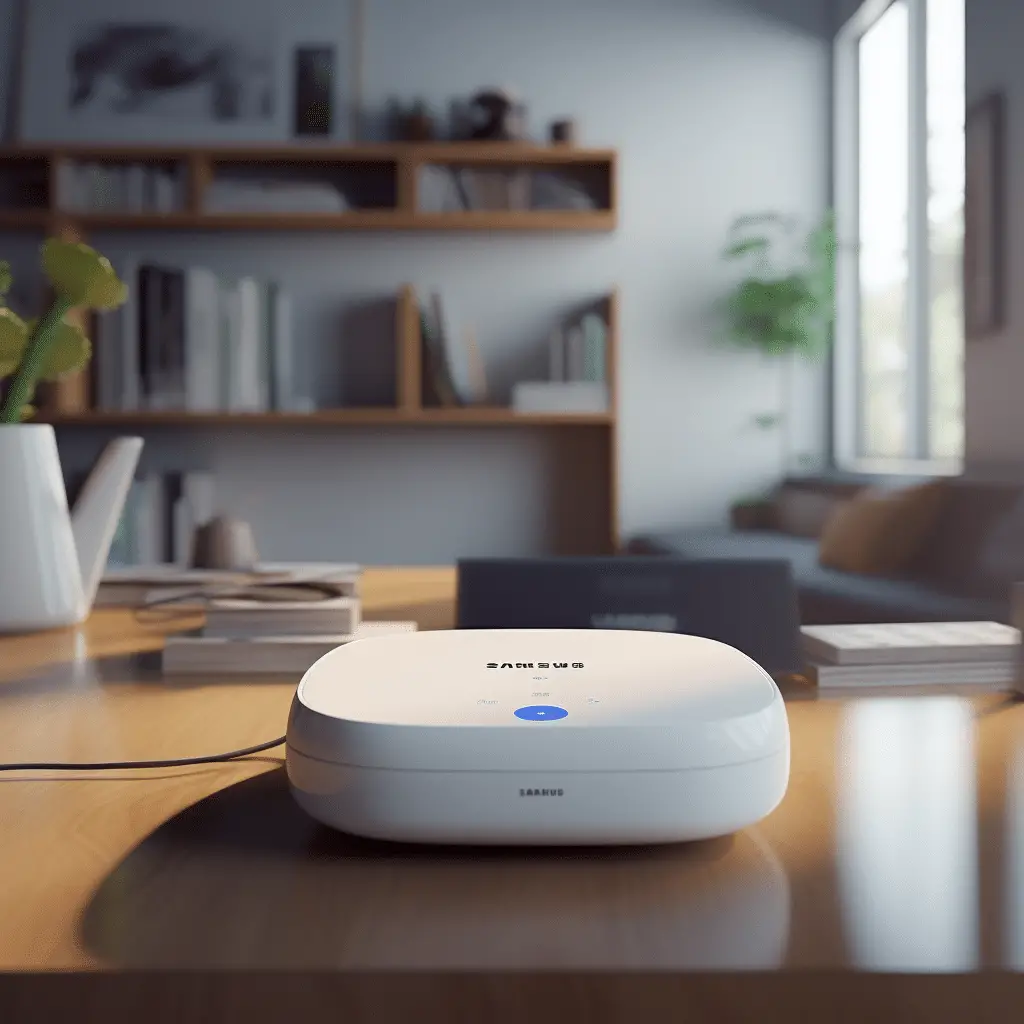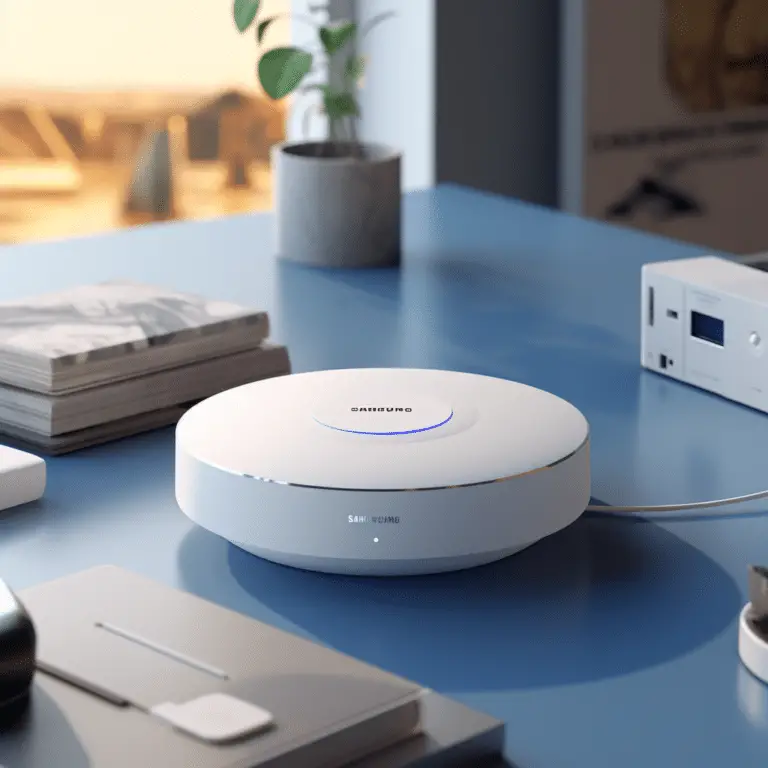Smart locks are revolutionizing the way we secure and access our homes. These innovative devices utilize advanced technology to provide enhanced security and convenience. In this article, I will delve deeper into the technology behind smart locks, exploring how they work, their key features, and their compatibility with other devices.
Key Takeaways:
- Smart locks use cutting-edge technology to enhance home security and simplify access.
- They eliminate the need for physical keys and offer keyless entry.
- Smart locks can be controlled remotely through smartphone apps, providing convenience and peace of mind.
- They can be integrated into a wider smart home ecosystem, working alongside other devices.
- Smart locks are compatible with various wireless communication protocols, allowing seamless connectivity.
The Samsung SmartThings Hub: The Brain of Your Smart Home Ecosystem
The Samsung SmartThings Hub is a vital component of any smart home ecosystem. Acting as the central control device, it allows homeowners to connect and manage a wide range of smart devices, all from one hub. With the Samsung SmartThings Hub, you can effortlessly control lights, thermostats, locks, and more, making home automation a breeze.
The SmartThings Hub works with popular protocols like Zigbee, Z-Wave, and Wi-Fi, which means it can integrate with thousands of devices from different brands. This makes it perfect for homeowners who want to create a customized smart home setup that suits their needs. You can use it to improve security, save energy, or enjoy the convenience of a connected home.
The SmartThings app is easy to use, and it lets you access and manage all your smart devices from your smartphone or tablet. It’s constantly updated to keep up with the latest devices and technologies.
The SmartThings Hub is compatible with a wide range of devices, giving you the flexibility to create a comprehensive smart home setup. You can also create custom rules and schedules to automate your home and simplify your daily routines.
The SmartThings Hub has security features like alerts to keep your home secure. You can connect it to third-party services like IFTTT for more automation and control options. Investing in the SmartThings Hub is a good choice for those who want a smart home. It’s compatible with many devices, easy to use, and has many features for convenience, security, and efficiency.
| Device Compatibility | Automation and Scheduling | Voice Control | Security and Monitoring | Integration with Third-Party Services |
|---|---|---|---|---|
| Supports a wide range of devices | Create custom rules and schedules | Compatible with Amazon Alexa and Google Assistant | Built-in security features and real-time alerts | Connect with services like IFTTT for advanced automation |
Key Features of the Samsung SmartThings Hub
The Samsung SmartThings Hub offers a range of key features that make it a versatile and powerful smart home hub. Here are some of its notable features:
- Device Compatibility: The SmartThings Hub is compatible with a wide range of smart devices, allowing homeowners to create a comprehensive smart home setup. It works seamlessly with devices that support popular protocols like Zigbee, Z-Wave, and Wi-Fi, ensuring compatibility with thousands of devices from various brands.
- Automation and Scheduling:The SmartThings Hub helps users control their smart home devices. They can create automation and scheduling rules. This makes it easy to manage devices and save energy. It also adds convenience.
- Voice Control: The SmartThings Hub integrates with popular voice assistants like Amazon Alexa and Google Assistant, enabling users to control their devices with simple voice commands. This hands-free control adds an extra layer of convenience and accessibility to the smart home experience.
- Security and Monitoring: The SmartThings Hub offers built-in security features, including real-time alerts and notifications. Users can receive instant updates on the status of their smart devices, ensuring peace of mind and enhancing the overall security of their homes.
- Integration with Third-Party Services:The SmartThings Hub can work with other services, like IFTTT. This lets you create even more smart home routines and automations.
The Samsung SmartThings Hub is a good smart home hub. It has many important features that make it reliable and efficient. With this hub, users can have a smart home experience that is seamless and connected. The SmartThings Hub is great for device compatibility, automation and scheduling, voice control, and enhanced security. Homeowners can use this hub to make their homes smart and connected.

Table: SmartThings Hub Comparison
| Features | SmartThings Hub | Competitor A | Competitor B |
|---|---|---|---|
| Device Compatibility | Compatible with Zigbee, Z-Wave, and Wi-Fi devices | Compatible with Z-Wave and Wi-Fi devices | Compatible with Zigbee and Wi-Fi devices |
| Automation and Scheduling | Yes | Yes | No |
| Voice Control | Works with Amazon Alexa and Google Assistant | Works with Amazon Alexa | Works with Google Assistant |
| Security and Monitoring | Real-time alerts and notifications | Real-time alerts | Notifications |
| Integration with Third-Party Services | Compatible with IFTTT | Compatible with IFTTT | Not compatible with any third-party services |
Smart Locks: Enhancing Convenience and Security
Smart locks offer homeowners enhanced convenience and security in managing their homes. With smart locks, the days of fumbling for keys or worrying about lost or stolen keys are over. These innovative devices provide keyless entry, allowing homeowners to lock or unlock their doors using wireless network technology like Wi-Fi or Bluetooth.
Smart locks let homeowners control access from anywhere using their smartphones. This eliminates the need for keys and offers more convenience. Some smart locks can automatically unlock when they detect the homeowner’s phone nearby. Smart locks also allow temporary or conditional access to guests or service providers using individual codes or virtual keys. This feature enhances security by eliminating the risks associated with lost or stolen keys. Smart locks are also difficult to bypass. With remote access control, homeowners can feel secure at all times.
| Benefits of Smart Locks | |
|---|---|
| Convenience | Keyless entry, remote access |
| Security | Eliminates risk of lost or stolen keys, advanced technology |
| Flexibility | Temporary or conditional access, individual codes |
How Smart Locks Work in a Smart Home Setup
In a smart home setup, smart locks utilize wireless communication protocols to connect and communicate with other devices in the home. These locks commonly use protocols such as Zigbee, Z-Wave, or Wi-Fi to establish a connection with a central hub. The hub, in turn, connects to the internet via Wi-Fi, enabling homeowners to control and monitor their smart locks remotely through a dedicated smart home app on their smartphones or tablets. This wireless connectivity allows for seamless integration and automation with other smart devices in the home.
Smart locks rely on cloud connectivity for functionality. Homeowners can access lock status, access logs, and user settings from anywhere. Firmware updates and remote management of lock features are also possible through cloud connectivity. The smart home app acts as a central hub for managing smart locks and other connected devices. Users can lock and unlock doors, view access logs, and grant temporary access to guests. Automation and control scenarios can be set up to trigger specific actions, like unlocking the door when a user’s smartphone is nearby.
Device Compatibility and Automation
Smart locks work with many devices for easy integration in a smart home. They can be used with lights, sensors, and cameras to make custom scenarios. When a smart lock is opened, it can turn on the lights and adjust the temperature for a welcoming atmosphere.
Furthermore, smart locks offer homeowners the ability to automate and control their locks based on specific conditions or events. Smart locks can lock automatically at a certain time. This ensures the home is secure even if the owner forgets to lock the door. Smart locks can also work with security systems. They can trigger alarms or send notifications if someone tries to enter without permission.
| Wireless Communication Protocols | Cloud Connectivity | Smart Home App | Device Compatibility | Automation and Control |
|---|---|---|---|---|
| Zigbee, Z-Wave, Wi-Fi | Enables remote access and management | Central control hub for smart home devices | Integrates with a wide range of smart devices | Allows for customized automation and control scenarios |
Devices Compatible with Smart Locks
Smart locks work with other smart devices to make homes more efficient. Smart lights can be controlled through an app to turn on and off automatically. Smart thermostats allow remote temperature control to save energy. Smart cameras provide real-time notifications and video feeds for added security. Sensors can automate actions like turning on lights or receiving alerts when a door is left open.
Smart home devices can be controlled and monitored from afar. This simplifies household tasks. Smart speakers like Amazon Echo and Google Home allow for voice-controlled smart locks. Homeowners can lock or unlock doors, check the lock’s status, and create custom voice-activated routines.
| Device | Compatibility |
|---|---|
| Smart Lights | Compatible |
| Smart Thermostats | Compatible |
| Smart Cameras | Compatible |
| Sensors | Compatible |
| Smart Appliances | Compatible |
| Smart Speakers | Compatible |

Conclusion
Smart locks can improve convenience, security, and efficiency in managing your home. They offer keyless entry and remote control capabilities, eliminating the need for physical keys. Biometric access control uses unique biometric characteristics like fingerprints or facial features to reduce unauthorized access. Smart locks are part of smart home technology, allowing homeowners to control and automate aspects of their homes through connected devices. They can integrate with other devices like lights, cameras, and voice assistants.Smart locks can be operated from a distance using a smart home app. This adds an additional level of security and convenience. They give peace of mind to homeowners and allow entry, remote access, and integration with other smart devices.
FAQ
What is the technology behind smart locks?
Smart locks utilize wireless communication protocols like Zigbee, Z-Wave, or Wi-Fi to connect to a central hub, which is then connected to the internet. This allows homeowners to control and monitor their smart locks remotely through a smart home app on their smartphones or tablets.
How do smart locks work in a smart home setup?
Smart locks work by connecting and communicating with other devices in the home through wireless communication protocols. They can be part of automation and control routines, allowing homeowners to create custom scenarios and enhance the overall smart home experience.
What devices are compatible with smart locks?
Smart locks are compatible with a wide range of smart devices, including smart lights, thermostats, cameras, sensors, appliances, and speakers. The compatibility may vary depending on the specific model and brand of the device.
What are the key features of the Samsung SmartThings Hub?
The Samsung SmartThings Hub is a versatile smart home hub that supports automation and scheduling. It is compatible with various smart devices, offers integration with popular voice assistants, provides built-in security features, and can be integrated with third-party services for advanced automation and control scenarios.
How do smart locks enhance convenience and security?
Smart locks offer keyless entry, allowing homeowners to lock or unlock their doors remotely using their smartphones. They also provide remote access, enabling homeowners to grant temporary or conditional entry to guests or service providers. This reduces the risk of lost or stolen keys and enhances security.

